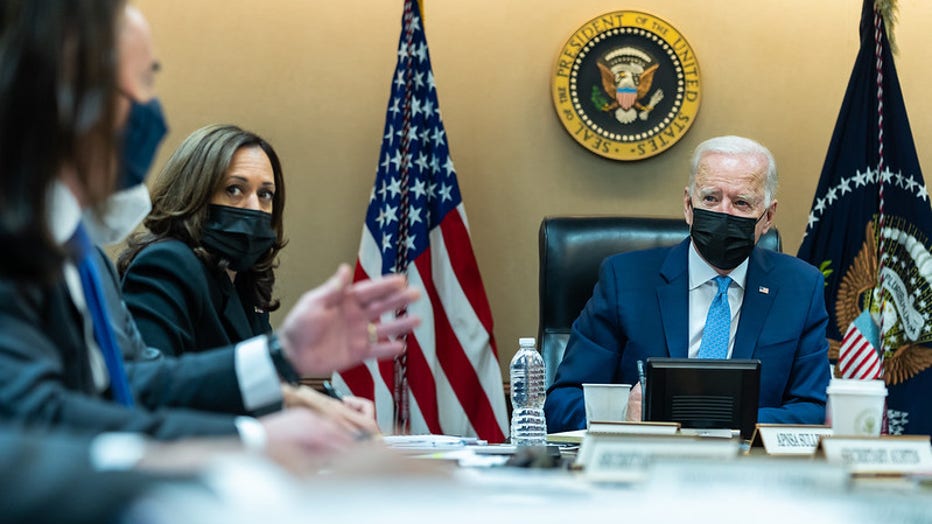Biden briefly transferred power to Harris during 'routine colonoscopy'
BETHESDA, Md. - President Joe Biden briefly transferred power to Vice President Kamala Harris on Friday while he underwent a routine colonoscopy, setting up a history-making moment as Harris became the first woman to hold that authority during the short time she stepped in as acting president.
President Joe Biden, 78, the oldest person to serve as president, transferred power to Harris, the first woman, person of color and person of South Asian descent to be vice president, for one hour and 25 minutes, while he was under anesthesia at Walter Reed National Military Medical Center. He turns 79 on Saturday. Press secretary Jen Psaki said Biden resumed his duties after speaking with Harris and White House chief of staff Ron Klain at approximately 11:35 a.m.
Interest in Biden’s health has been high ever since he declared his candidacy for the White House in 2019 and remains intense as speculation about a 2024 reelection bid swirls. The visit to the medical center in the Washington suburbs was for his first routine physical exam as president — and his first since December 2019.

FILE - President Joe Biden and Vice President Kamala Harris meet with their National Security team on the situation in Afghanistan, on Aug. 31, 2021, in the White House Situation Room. (Official White House Photo by Adam Schultz)
While serving as acting president Harris was working from her office in the West Wing, Psaki said. She later traveled to Ohio once Biden awoke from the procedure.
Biden was keenly aware of the history he was making when he selected Harris to be his running mate, Psaki said, adding that she made "history every day" in the job.
"Today was certainly another chapter in that history I think that will be noted for women, young girls across the country," she added.
During Biden's last physical exam, doctors found the former vice president to be "healthy, vigorous" and "fit to successfully execute the duties of the Presidency," according to a doctor’s report at the time.
Dr. Kevin O’Connor, who has been Biden’s primary care physician since 2009, wrote in a three-page note that the then-presidential candidate was in overall good shape.
RELATED: 'It's about time': Harris, Pelosi make history flanking Biden during address to Congress
In that report, O’Connor said that since 2003, Biden has had episodes of atrial fibrillation, a type of irregular heartbeat that’s potentially serious but treatable. At the time, O’Connor cited a list of tests that showed Biden’s heart was functioning normally and his only needed care was a blood thinner to prevent the most worrisome risk, blood clots or stroke.
Biden had a brush with death in 1988, requiring surgery to repair two brain aneurysms, weak bulges in arteries, one of them leaking. Biden has never had a recurrence, his doctor said, citing a test in 2014 that examined his arteries.
Pursuant to the 25th Amendment to the Constitution, Biden signed letters to Sen. Patrick Leahy, who's president pro tempore of the Senate, and to House Speaker Nancy Pelosi at 10:10 a.m., saying he would be unable to discharge his duties while under anesthesia, making Harris the acting president. Biden sent them each another letter upon the conclusion of the procedure to resume his duties at 11:35 a.m.
"As was the case when President George W. Bush had the same procedure in 2002 and 2007, and following the process set out in the Constitution, President Biden will transfer power to the Vice President for the brief period of time when he is under anesthesia," Psaki said before Biden’s colonoscopy.
On Friday afternoon, Biden is scheduled to take part in the annual pardoning of the national Thanksgiving turkey.
When Biden took office he brought O’Connor back to the White House to continue serving as his doctor, and O'Connor was expected to have led a team of experts in conducting Biden's physical exam Friday.
RELATED: ‘Please do the right thing’: Biden receives COVID-19 booster shot on camera
Once the COVID-19 pandemic emerged in early 2020, Biden’s team took intense steps to keep the then-candidate and now-president healthy as the virus raged and took a disproportionate toll among older populations. Biden received his first dose of the COVID-19 vaccines in December 2020 and his second dose just two weeks before taking office. He received a booster dose, which regulators say provides more enduring protection, in late September.
Psaki said Biden's doctor's would release a "comprehensive written summary" of his physical, as is customary for presidents and presidential candidates. Former President Donald Trump, 75, was sharply criticized for releasing only cursory details on his health while running and serving in the White House, including concealing the seriousness of his COVID-19 illness a month before the 2020 presidential election.

